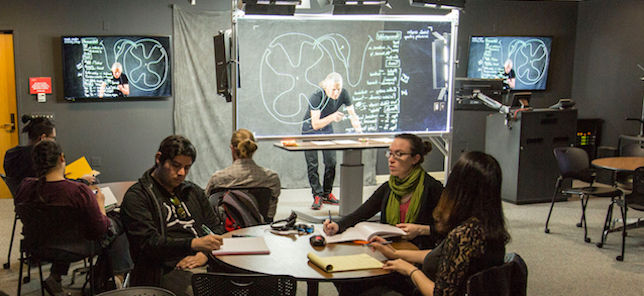Learning Technologies Group, the parent company of Open LMS (formerly Moodlerooms), has acquired eThink Education. With the acquisition, eThink will be integrated into Open LMS.
Michigan State University Libraries has committed to adopting FOLIO, an open source project that is building a platform for library services.
Researchers at MIT's Sloan School of Management have developed a new software platform for having private, on-the-spot conversations online. Called Minglr, the open source tool is designed to replicate the kinds of interactions people might have before and after meetings, in the lobby during breaks of conferences and around the office coffee machine, in a virtual environment.

Does research at your institution have the visibility and impact it could? A new class of open source tools can be used to create a modernized, 21st century 'digital research ecosystem' that will help faculty and graduate researchers advance their research objectives and gain recognition for their work.
Library research provider EBSCO Information Services has invested in two innovative open access research-oriented companies. The first, Code Ocean, is a cloud-based "computational reproducibility" application that lets researchers and developers create, share, discover and run scientific code. The second, protocols.io, is a service for academic and industry researchers to record and share detailed up-to-date methods for research.

A new project has been launched to help universities, researchers, libraries and publishers make more —and better — use of open-access book publishing in humanities and the social sciences. The Community-led Open Publication Infrastructures for Monographs is a partnership led by Coventry University in the United Kingdom and including the University of California Santa Barbara Library, among other institutions.

The University of California system and Carnegie Mellon University are both piloting the use of a platform called protocols.io in an effort to bring down a major barrier to reproducible research: the creation and sharing of detailed methods in published articles.

Carnegie Mellon University has moved forward in its efforts to release education tools into the world. Last week, the institution officially introduced OpenSimon, a community and collection of tools dedicated to "[catalyzing] a revolution in learning and teaching" for higher education and K-12.

An individual who won both the A.M. Turing Award for his contributions to artificial intelligence in 1975 and the Nobel Prize for Economics in 1978 is the inspiration behind Carnegie Mellon University's decision to make many of its own learning tools, software and content openly available over the next year.

FLEXspace, the Flexible Learning Environments eXchange, has changed over time, starting out in 2013 as a great place to showcase and exemplify learning spaces, then rapidly growing to include a comprehensive toolset for planning and assessing these spaces, and now connecting a vibrant research community. Here, CT gets an update from FLEXspace.org pioneers Lisa Stephens and Rebecca Frazee.